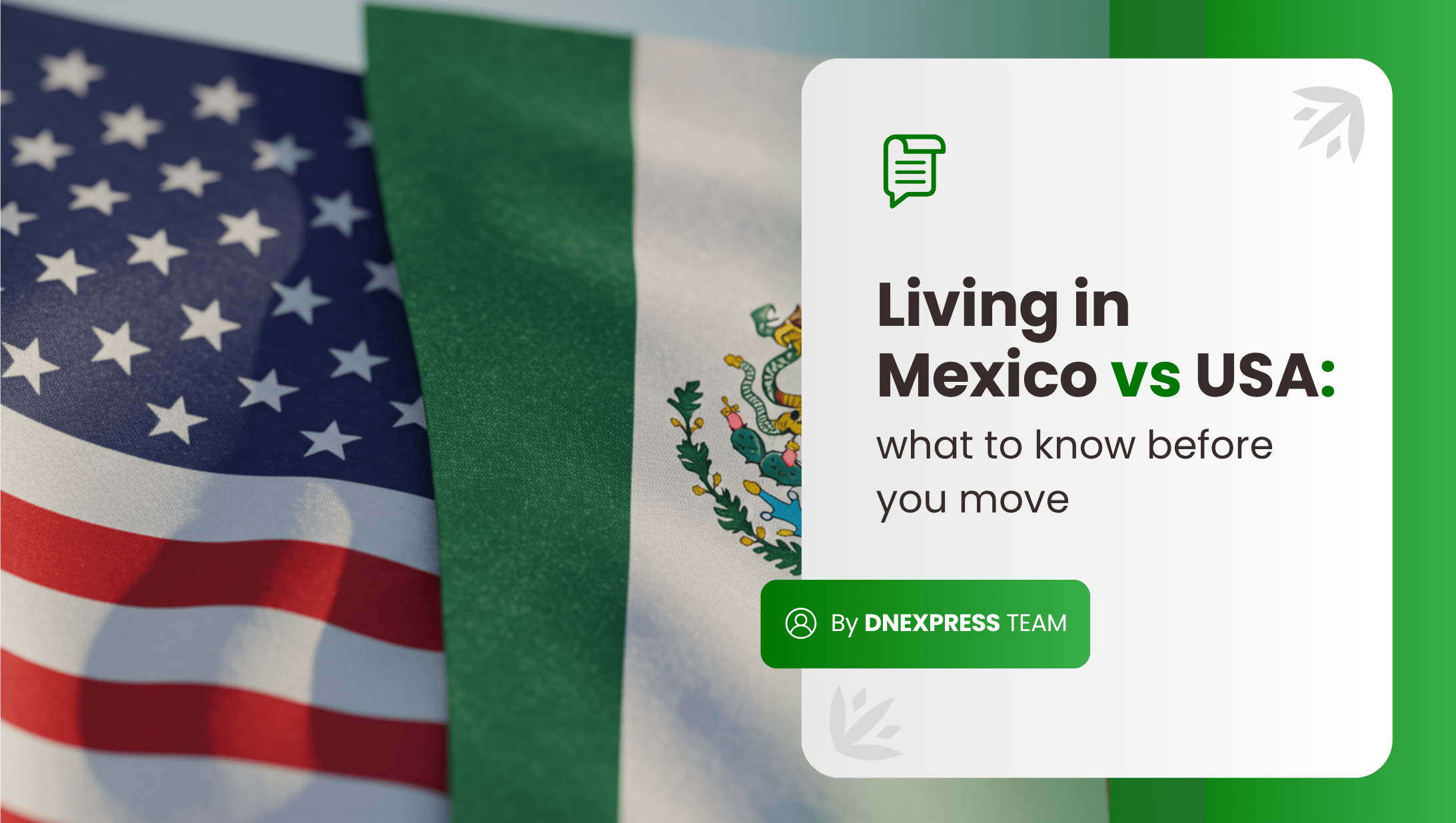
Considering a move to Mexico? From cost of living and healthcare to dual citizenship options, here's everything U.S. citizens, especially those with Mexican roots, need to know before making the leap. Discover how life in Mexico compares to the U.S., and if it's the right move for you.
For some, it's about saving thousands on rent and healthcare. For others, it's a cultural return home, or a legal path to finally claim what's theirs. Whether you're seeking a slower pace, cheaper lifestyle, or a future for your family outside the U.S., this article will give you the facts and legal clarity you need to decide.
Our team has helped thousands of U.S.-born Mexicans and their families reclaim their nationality. We correct denied or broken applications and legally move forward without ever stepping foot in a consulate. We exist to remove the fear, paperwork errors, and confusion from a system that often feels designed to keep people out.
If you want to know where life might be better, how citizenship affects your move, and what's actually required to live well in Mexico, keep reading. We'll break it all down, step by step.
Quick Comparison: Daily Life in Mexico vs the U.S.
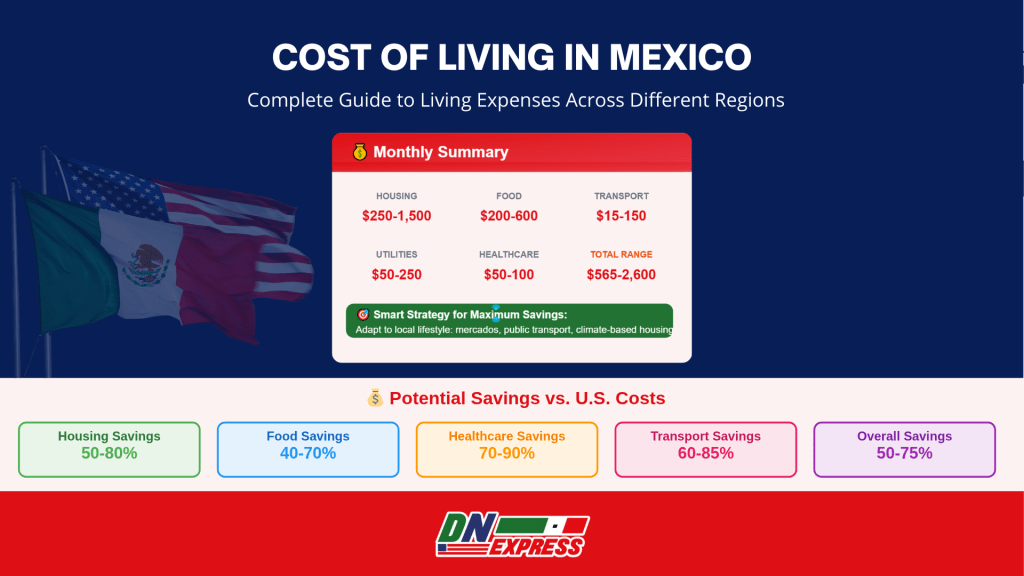
Before making any big move, it helps to see how daily life actually compares. Here's a side-by-side breakdown of the major lifestyle differences between living in Mexico and the United States. This comparison is especially relevant for U.S. citizens considering a permanent or dual-national move:
Cost of Living: 39% Cheaper in Mexico
From groceries to rent, nearly everything costs less in Mexico. Many U.S. expats live comfortably on $1,500-$2,000 a month. This lifestyle would be nearly impossible in most American cities.
Healthcare: 50% Less Expensive, Often Faster
In Mexico, you can walk into a pharmacy and see a licensed doctor for under $5. No appointment needed, no weeks-long wait. Public healthcare is free for citizens, while private care remains far cheaper than in the U.S.
Housing: $500-$900 Rents vs $1,700+ in U.S.
A modern one-bedroom in cities like Mérida or Guadalajara can cost as little as $500/month. Luxury apartments in Mexico City or Playa del Carmen rarely exceed $1,000.
Utilities & Internet: Reliable in Cities, Patchy in Rural Areas
City infrastructure generally offers stable internet and power. Telmex internet plans start at $20-$30/month. But in smaller towns or beach communities, outages are still common.
Food: $5 Street Eats vs $20 U.S. Meals
Fresh tacos, tlayudas, and home-cooked comida corrida meals are available for $3-$6 USD. Dining out in the U.S. averages $20 per person, even at modest restaurants.
Transportation: Metro for 25¢, Walkable Cities
Public transport is cheap and accessible in Mexican cities. A metro ride in CDMX costs about 25 cents, compared to $2.90 in NYC. Many towns are highly walkable and bike-friendly.
Safety: Depends on the Area
Contrary to stereotypes, many Mexican cities are safer than U.S. ones. Mérida, Querétaro, and San Miguel de Allende consistently rank among the safest for both locals and expats.
Community: Family-Focused, Slower Pace
Family is the heart of Mexican life. There's a stronger emphasis on relationships, local community, and taking time to enjoy meals and gatherings. Many Americans say they miss this sense of connection.
Language: Spanish Is Necessary Outside Tourist Zones
In tourist-heavy areas, you'll get by with English. But to truly integrate and avoid overpaying, it helps to learn Spanish. Not speaking it can limit legal and social access in daily life.
Bureaucracy: Expect Paperwork and Delays
From banking to getting a CURP (national ID), Mexico's systems are often paper-based and slow-moving. Having local help or legal representation makes a huge difference.
Cultural Shift: Less Punctuality, Greater Hospitality
“Ahorita” doesn't always mean “now.” Schedules are fluid, and being late doesn't count as disrespectful. But you'll also find warmer greetings, genuine curiosity, and kindness from strangers.
Want to know how all of this plays out depending on your specific situation? Whether you're claiming dual citizenship, moving as a retiree, or applying for your child? Keep reading.
20+ Must-Know Facts About Life in Mexico (vs the U.S.)
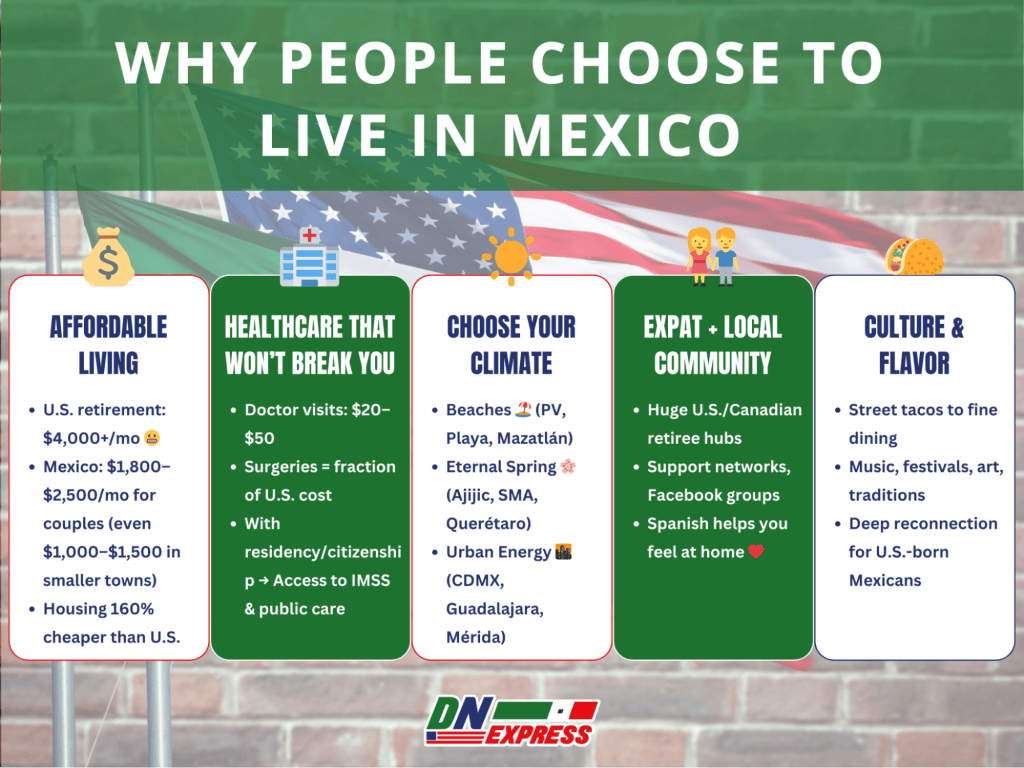
Whether you're planning to relocate or reclaim your Mexican nationality, grasping the everyday realities of life south of the border can help you make a confident decision. Here are key facts about living in Mexico, from finances and healthcare to infrastructure and culture:
Cost of Living: Lower Expenses, Higher Quality of Life
According to World Bank data, Mexico's average household net adjusted disposable income is significantly lower than OECD countries, but this translates to remarkably affordable living costs for Americans.
- $1,500-$2,000/month is enough to live comfortably in most urban areas.
- Cities like Mérida, Querétaro, and San Cristóbal de las Casas offer the best mix of affordability and safety.
- Rent for a 1-bedroom apartment ranges from $400-$700, even in city centers.
- If you're currently spending $3,000+ to get by in the U.S., the savings in Mexico could transform your lifestyle completely.
Healthcare: Affordable and Accessible
- Mexico offers universal public healthcare (IMSS, ISSSTE) and affordable private care.
- Common medications are available without a prescription, saving you time and money.
- Local doctors offer consultations for $2-$5 USD, often at walk-in pharmacy clinics.
- Many expats maintain private insurance for top-tier hospitals, but even out-of-pocket costs are manageable.
- For retirees and families, the healthcare system is often a deciding factor.
Property Ownership: Easier with Dual Citizenship
- Mexican citizens (including dual nationals) can own property without restrictions, even near beaches and borders.
- Foreigners must buy through a fideicomiso, a legal trust held by a Mexican bank.
- Dual citizenship simplifies inheritance, registration, and capital gains tax processes.
- Many clients come to us for citizenship specifically to unlock easier real estate rights in Mexico.
Internet, Utilities & Infrastructure
- Internet plans start at $20-$30/month, but quality varies by region.
- Basic utilities average $60-$80/month, including electricity, gas, and water.
- City infrastructure is generally reliable, but rural or coastal areas may face periodic outages or slow repairs.
This is a key concern for remote workers and digital nomads. Choose your city wisely.
Language & Culture: Warm, But Requires Adaptation
- Spanish doesn't have to be perfect, but it's necessary if you want to integrate and avoid overpaying.
- Concepts like “ahorita” (which can mean “now,” “later,” or “maybe”) reflect a more relaxed, flexible sense of time.
- Expect formal greetings, polite speech, and deep respect for family hierarchies and community events.
If you weren't raised speaking Spanish, don't worry. We help clients navigate legal and everyday life without fluency.
Note
The World Bank's Mexico overview notes that while Mexico faces economic challenges, certain regions consistently offer high quality of life at affordable costs. Research from Pew Research Center shows that Mexican-Americans increasingly view these cities as viable alternatives to expensive U.S. metropolitan areas.
Additional services that may help your transition include document translation, passport renewal assistance, and consulate appointment scheduling.
For official information about dual nationality policies, consult the Mexican government's official guidance on maintaining citizenship in both countries.
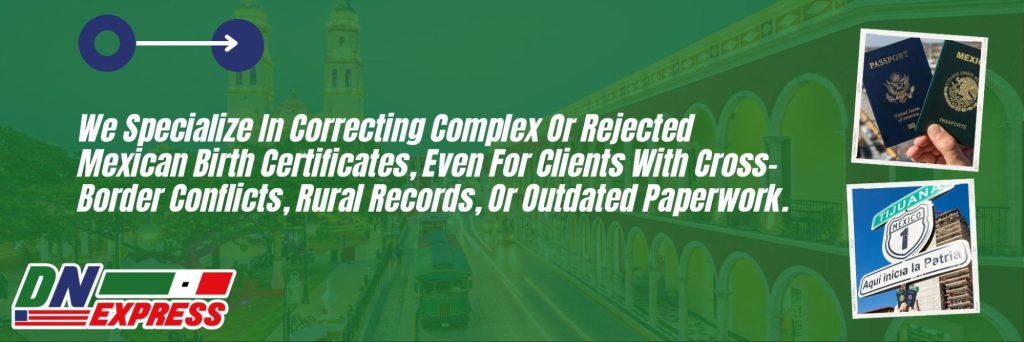
5 Frequent Fears About Moving to Mexico
No matter how ready someone feels to leave the U.S. or reclaim their Mexican heritage, fears can hold them back. I've heard them all from parents, retirees, and even second-gen adults starting the process. If you're feeling uncertain, these concerns are completely normal. Let's address the most frequent worries head-on.
“What if I get scammed applying for citizenship?”
Unfortunately, this is a valid concern. Many people fall into the trap of paying document preparers or “gestores” who lack legal credentials. These services often make promises they can't keep and leave clients in worse shape than when they started.
That's why our service is fully attorney-led. Every case is handled by licensed Mexican professionals, recognized by federal and state institutions. You never deal with middlemen, and you're protected every step of the way.
“I don't speak Spanish, will I struggle?”
This is a major fear for U.S.-born applicants and retirees alike. While English is common in tourist zones like Cancún or Puerto Vallarta, daily life is in Spanish. This is especially true when dealing with government offices, healthcare, or legal matters.
You don't need to be fluent to start your process. Our bilingual team helps you navigate paperwork and local requirements, and many clients use this journey to reconnect with the language at their own pace.
“Can I trust Mexican authorities?”
Concerns about corruption and inconsistency are valid, especially if you've read headlines or had a bad past experience. The truth? Trustworthy government offices exist, but knowing how to work with them legally is necessary.
Our team knows which offices to use, which to avoid, and how to protect your documentation through every step of the process. You won't walk into a single government office alone, or at all, if you don't want to.
“What if I'm denied again?”
Many of our clients were denied years ago, often due to document errors, missing information, or consulate misinformation. The worst part? They gave up, thinking the answer was final.
We reopen and win rejected cases all the time. We've helped clients fix mismatched birth certificates, recover lost records, and apply from scratch the right way, even decades later.
“I'm nervous about doing this from abroad.”
You don't need to travel to Mexico or spend weeks waiting for a consulate appointment. Our entire service is built to support families from the U.S., Europe, or anywhere in the world.
With remote filing, bilingual communication, and attorney-only handling, we've helped people apply from all 50 states without stepping foot in Mexico.
Fear is normal. But being stuck, especially when you have a legal right to reclaim your identity, doesn't have to be permanent. If you've been unsure about starting your process, I invite you to learn what's possible when you're guided by people who know the system inside and out.
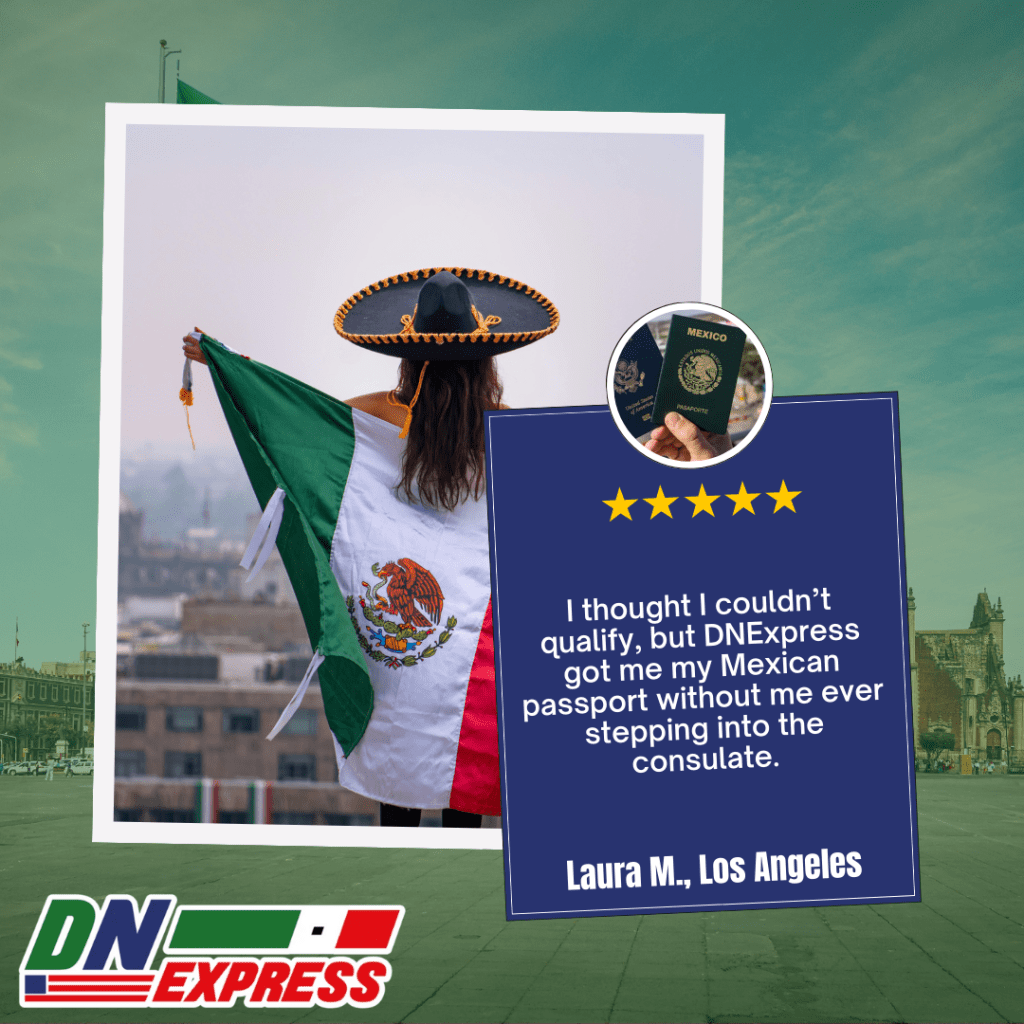
DIY vs Hiring Doble Nacionalidad Express
When it comes to reclaiming your Mexican nationality, applying for dual citizenship, or securing legal status for your family, you technically can try to do it yourself. But should you?
Here's what we've learned after helping thousands of people who tried the DIY route first and came to us after they hit a wall.
Doing It Yourself (DIY): What Can Go Wrong
Many clients start out thinking they can handle the process solo. After all, the consulate websites make it sound simple. But here's what they don't tell you:
- Long consulate delays (6+ months) for an appointment
- Inconsistent rules that vary by consulate and by state
- Hard-to-fix document mismatches (like missing accents, wrong dates, or different spellings)
- No legal support if your application is denied or lost
- Zero recourse if you submit something incorrectly
- One missed detail, like an uncorrected birth certificate or outdated CURP, can delay your process for years.
Why Choose Doble Nacionalidad Express
We built our service around what families need: clarity, speed, and trust. You won't simply get documents filed. You'll get an entire legal team on your side, from day one.
- Complete the process without visiting a consulate
- Handled entirely by licensed Mexican attorneys
- Bilingual support via phone, email, or WhatsApp
- Experience with tough, rejected, or incomplete cases
- Your documents are secure, no third-party outsourcing
- Affordable, transparent pricing with payment plans available
- We serve all 50 U.S. states and clients abroad
- Recognized by official Mexican government offices
“I thought my case was hopeless, but they got it done fast.” Laura M., Los Angeles
If you're serious about doing this the right way, you don't need to gamble with your identity or your time. We're not simply a document service. We're your legal team.
Ready to Explore Dual Citizenship or a Move to Mexico?
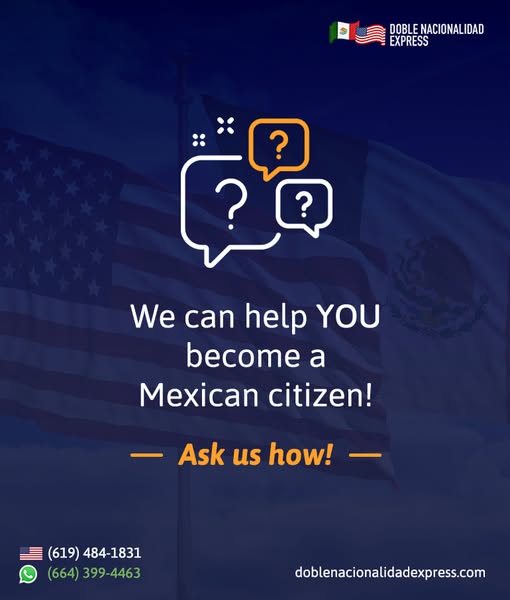
If you've read this far, chances are you're not merely curious. You're ready for something different.
Maybe it's about returning to your roots. Maybe you want your kids to grow up with both flags, both languages, and both legal protections. Or maybe you're ready for a better quality of life than what the U.S. is offering right now.
Whatever your reason, reclaiming your Mexican nationality is one of the most powerful and personal decisions you can make. And you don't have to do it alone.
We built this legal service for families like yours. We believe that culture is power, paperwork shouldn't be a barrier, and everyone deserves to feel legally and culturally recognized on both sides of the border.
Here's How to Get Started:
Schedule a Free Case Review or Message Us on WhatsApp
Learn About Dual Citizenship Services
You don't have to wait for a consulate appointment. You don't need to second-guess your eligibility. And you definitely don't need to do it alone.
Let's make your next chapter in Mexico a legal reality.
FAQ
As someone who helps people transition to life in Mexico every day, I hear the same key questions come up. Whether they're planning to retire, reconnect with their roots, or give their children opportunities, here are the most significant ones, answered clearly and honestly:
Can I live in Mexico if I am a U.S. citizen?
Yes. You can stay for up to 180 days on a tourist visa, or apply for temporary residency if you meet income or savings requirements. According to the U.S. Embassy in Mexico, if you qualify for Mexican citizenship through descent, you can skip the visa path entirely and enjoy full rights.
Pro Tip: If your parent was born in Mexico, you may be eligible for citizenship, even if you've never lived there.
What is the 183-day rule in Mexico?
If you spend over 183 days in Mexico in a calendar year, you may be considered a tax resident. This means you could be taxed on your global income under Mexican law. However, tax treaties between the U.S. and Mexico help prevent double taxation.
Do U.S. citizens living in Mexico pay U.S. taxes?
Yes. U.S. citizens must report and pay taxes on worldwide income, no matter where they live. That said, most Americans living in Mexico do not end up double-taxed, thanks to foreign income exclusions and the U.S.-Mexico tax treaty.
How much money do I need to move?
To apply for temporary residency, you'll need to show around $2,500/month in income or $43,000+ in savings. These requirements vary slightly depending on the Mexican consulate or legal path you choose.
And yes, you can do all of this without setting foot in Mexico first, with the right legal support.
Is $2,000/month enough to live in Mexico?
Absolutely. According to OECD Better Life Index data, Mexico's cost of living allows for comfortable middle-class living at income levels that would be challenging in the U.S. In most cities, $2,000/month covers rent, groceries, healthcare, and even some luxuries like travel or help around the house. Cities like Mérida, Querétaro, and Puebla offer safe, middle-class living well below U.S. prices.
Can an American inherit property in Mexico?
Yes. But if you're not a citizen, the process can be slower and complicated. Dual nationals benefit from simpler inheritance laws and fewer restrictions on owning land in coastal or border zones.
How do I avoid capital gains tax in Mexico on property?
Mexican citizens (including dual citizens) can access certain exemptions and tax benefits when selling property. With the right documentation and guidance, you may reduce or eliminate capital gains tax entirely.
Does Mexico have free healthcare?
Yes. Public healthcare (like IMSS) is available for residents and citizens at little or no cost. You can also choose private clinics, where appointments are faster and affordable. Many Americans use a mix of both.
Where is the cheapest and safest place to live in Mexico?
Top picks include Mérida (widely considered the safest city in Mexico), Querétaro, Guanajuato, and San Cristóbal de las Casas. Each offers walkability, rich culture, and welcoming expat and local communities.



